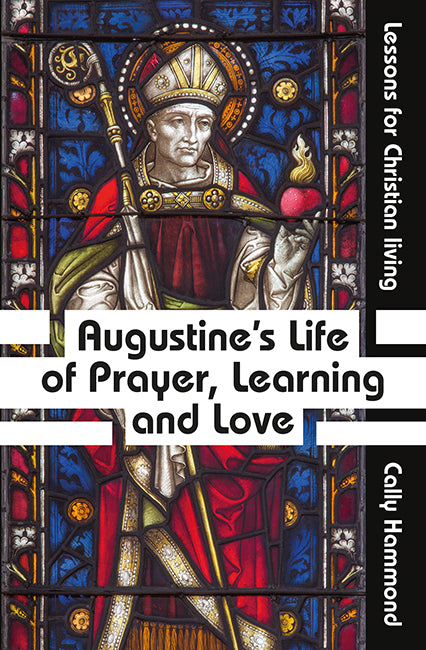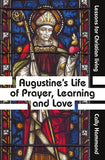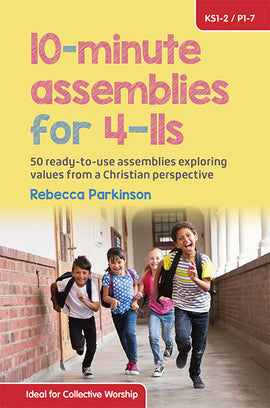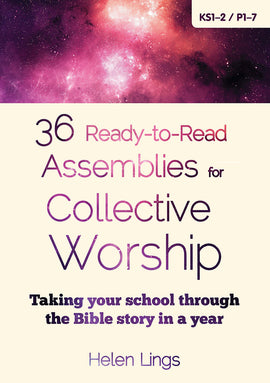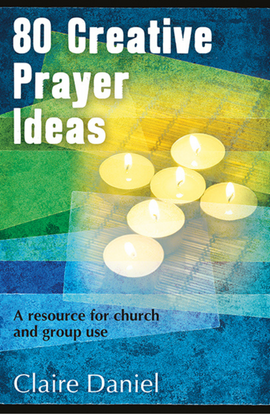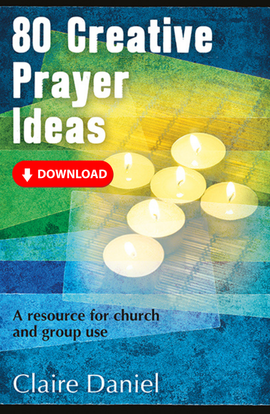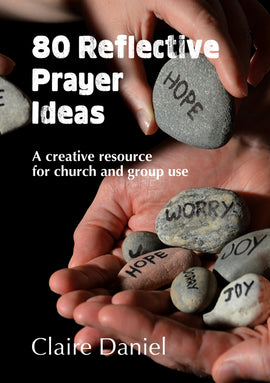Augustine's Life of Prayer, Learning and Love: Lessons for Christian living
Learn about Christian life from St Augustine of Hippo (AD 354–430)
What can we learn from Augustine?
There are many books that tell the life story of Augustine and how he has been fundamental in shaping Western Christian theology and practice. This is not one of them. This book is about how he became a Christian – the problems he faced; the doubts he struggled with. It is about how he made sense of his belief in God, and shared it with other people. It is about how he learned to read the Bible, and to pray. And it is about the word which is at the heart of his Christian life – love. It concludes with moments of prayer from Augustine’s life, in which he glimpses visions of God, encouraging the reader to take their own next steps in discipleship.
Digital Product - This title is now out of print but is still available digitally. Please click the button below to buy on Kindle or click below to visit our eBooks collection to buy this product for your smartphone and/or tablet. - Go to eBooks
| Title | Augustine's Life of Prayer, Learning and Love: Lessons for Christian living |
| Author | Cally Hammond |
| Description | What can we learn from Augustine? |
| Details |
|
What can we learn from Augustine?
There are many books that tell the life story of Augustine and how he has been fundamental in shaping Western Christian theology and practice. This is not one of them. This book is about how he became a Christian – the problems he faced; the doubts he struggled with. It is about how he made sense of his belief in God, and shared it with other people. It is about how he learned to read the Bible, and to pray. And it is about the word which is at the heart of his Christian life – love. It concludes with moments of prayer from Augustine’s life, in which he glimpses visions of God, encouraging the reader to take their own next steps in discipleship.

Cally Hammond studied ancient history and literature before becoming ordained in 1998. After serving as a parish priest in Bedfordshire, she was appointed Dean of Gonville and Caius College, Cambridge, where she teaches New Testament Greek and early Christian history. She has published a trilogy of books on prayer, and her new edition and translation of the Confessions of St Augustine was published in 2014–16. Cally was one of the judges for the Church Times 100 Best Christian Books selection.
This engaging and handy little book is a great gift to every person who is trying to give the Christian life a go. It is brilliant, sensible catechesis to guide us through the ups and downs, the joys and frustrations, of life with God (and with each other) - at times helpfully frank, at times exposing the textures of complexity. In Cally Hammond's writing we are guided by one who has clearly lived, breathed, studied, and prayed with St Augustine's words and ideas, and found in his own struggles and paradoxes windows into our contemporary condition - as humans, as Christians, as a Church in progress. This book deserves a long life indeed.
The Revd James Crockford, Dean of Chapel and Fellow, Jesus College, Cambridge
An extraordinary book, beautiful in its eloquence and simplicity, it resonates at a deep level. What I admire most is the author’s ability not to look over her shoulder to the scholarly community, but to address the ordinary reader without diminishing or simplifying the depth and complexity of Augustine’s ideas. Next semester, when I teach the Confessions again, I'd like to incorporate this book in some form.
Professor Tarmo Toom
I am so grateful for this delightful and accessible introduction to Augustine, one of the most fascinating figures of Christian history. Here is the wonder and challenge of the Christian faith through Augustine's most personal of writings, skilfully interpreted to show how our most human struggles and longings can bring us to the love of God.
Revd Angela Tilby, Canon Emeritus of Christ Church, Oxford
Transforming Ministry Spring 2020. Review by Hugh Morley
Cally Hammond has written a trilogy of books on prayer and recently published her new edition and translation of Augustine’s Confessions. She has studied ancient history and literature and now teaches New Testament Greek and early Christian history at Cambridge. The result is an intriguing book with each chapter following a similar format, analysing parts of Augustine’s life, interspersed with quotations from his works, followed by a ‘Bible passage for reflection’, questions for discussion and a prayer drawn from his writings. The nine chapters take us on a journey through Augustine’s life where the author explores issues such as his faith, conversion, teaching, prayer, his deep devotional life and the struggle he experienced in faith. This book is packed with insights into the great man’s life. Many books have been written about Augustine, but here is one which will encourage us to delve deeper into his Confessions in a new way: a book for personal interest that could well be used in small groups.
Reviewed by Hugh Morley
The Church Times 13.9.19. Review by John Binns
This new book brings Augustine into the present, says John Binns
St Augustine was one of the Early Church’s great theologians. He left a huge collection of writings, on theology, biblical commentary, society, and politics, including hundreds of sermons. Among them was a book that has become known as the Confessions. Most of it is autobiographical, and it can be described as the first Christian autobiography. In it, he reveals his inner thoughts, struggles, and temptations as he slowly comes to faith, and then as he continues to think, pray and teach.
Cally Hammond has recently published a major two-volume edition and translation of the Confessions, which addresses historical, theological and critical issues. Here she returns to the Confessions, but with a very different approach. She wants us to understand Augustine’s faith journey and to discover that the things that concerned him are the same as those which concern us. So the faith that Augustine discovers and builds can shape and support us in our journey as well.
There are nine sections, each discussing a theme of faith, such as how we come to faith, how we should read the Bible, how we grow in faith after baptism, why there are conflicts and divisions within the Church, and how we can best worship in a community and pray privately.
There are frequent extracts from the Confessions, in Hammond’s own lively and engaging translation; she then shows the thinking behind them and grounds them in a contemporary setting by placing her own stories and experiences alongside. She firmly avoids all academic and critical comment, not even providing references to the extracts that she chooses. Each section finishes with a Bible passage, some questions for discussion and a prayer. This locates the book very firmly within the Christian life of the reader.
The book brings one of the great thinkers of the past vividly into the present. I found many thoughts and ideas that made sense to me and will form part of my own faith. It is a wonderful book, which can be used for individual study and could also be an absorbing discussion-starter for a group work.
Reviewed by Revd Dr John Binns is Visiting Professor at the Institute for Orthodox Christian Studies, Cambridge.
_______________________________________________________________
Review by Richard Frost
If you thought that all St Augustine ever talked about was ‘original sin’ then this book will enrich your mind. As the author Cally Hammond puts it, ‘In public, Augustine was bishop, a leader in the church and in society, an intellectual giant.’ Yet, like so many of us, he was, she says ‘in private, often needy of reassurance, guidance and affirmation.’ And that is key to this excellent book – amidst his greatness, Augustine of Hippo was just like so many of us.
Having written her own translation of the 13 books of Augustine’s autobiographical Confessions (which she draws upon for much of this book), as well as being Dean of a Cambridge University college, one would be forgiven for expecting an academic treatise. But Cally Hammond’s writing is far from that. It is accessible, engaging and reflects her own response to the joy and wonder which Augustine experiences in his journey of faith. It is a compelling and uplifting read.
Cally Hammond opens up many aspects of Augustine’s life and relates them not only to the context in which he lived but also to our modern day, 21st century joys and difficulties. She explains how Augustine struggled with parts of the Bible, argued with others, fought to overcome heresy and schism, and enjoyed doing something that was wrong: ‘I was loathsome and I loved it,’ he wrote at one point. As he grew older, his views changed, and his faith developed a deeper understanding of God. His life was about faith seeking understanding, as ours is to be.
Cally Hammond explains how as a preacher, teacher and Bible scholar, Augustine provides a model for today’s leaders: ‘His task was to preach Christ, not himself,’ she writes. ‘And it was no good, he knew, preaching to people in a way that went over their heads.’ We also learn how Augustine developed a life of prayer both with others and by himself. One chapter includes fascinating accounts of the visions he received in which he experienced the joy and wonder of knowing God. Cally Hammond’s accounts of these are particularly compelling.
This is a book or surprises: the most unexpected and beautiful of which is the poetry written by this great man of God.
So what of original sin? Once again, Cally Hammond explains very clearly what Augustine meant and what he didn’t: ‘Augustine would have agreed completely that life in this world exposes us to all sorts of sin. But he knew that the only reason sin affects us is our inborn inability to resist doing wrong. And that is not something we just pick up as life goes along; it is fundamental to who we are… Augustine did not shy away from teaching a doctrine just because it was hard.’
We see painted a picture of man who was, like many people, often very different on the public-facing, outside than on the private, God-facing inside. Yet they all go to make up the man who Augustine of Hippo. But this awareness provides a valuable learning point also: ‘This is something I always encourage people to reflect on and remember,’ writes Cally Hammond, ‘that it is a mistake… to compare the outside of other people’s lives with the inside of our own life.’
Cally Hammond has given us a very accessible and easy to read book about one of the great, early church figures. She demonstrates how all of us can not only learn from him and but also experience some of what he experienced.
Richard Frost is the author of Life with St Benedict and writes a blog at workrestpray.com
______________________________________________________________

